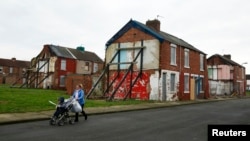A new report by advocates for asylum seekers in Britain says women fleeing persecution and sexual violence are often made destitute in Britain, meaning they live in absolute poverty without access to housing, financial support or the right to work.
The report by the non-governmental organization Women for Refugee Women says of the asylum-seeking women becoming destitute in Britain, three-quarters ended up in that situation their asylum claim was rejected.
The group researched how asylum-seeking women survive in Britain after being made destitute. The report states they are hungry, homeless, and some deal with mental health issues. A third of the women surveyed said they were raped or sexually abused in their country of origin, and - for many - it happened again when they became destitute in Britain.
Women for Refugee Women's Priscilla Dudhia headed the research. She says destitute women suffer in ways different from men.
“For example, the prevalence of sexual violence being caught in abusive relationships, the struggles that women go through to access period products like pads and tampons," said Dudhia. "And there was a sense among the women in our network, that although there's been some really good research on asylum, and migrant destitution more generally, the specific experiences of refugee women aren’t properly understood.”
Christina, not her real name, is among 16 percent of women that the NGO report says are persecuted for their sexuality. Coming from Cameroon, a country with laws against homosexuality, she faced abuse and ostracism by both her family and the community when people found out she was a lesbian.
She came to Britain as a student, looking for safety. After completing a master's degree in business, she applied for asylum as she still faces violence at home. But now, ten months later, there has been no update on her asylum request. The insecurity of her status is making her feel vulnerable once again.
“I have a bachelor degree, I have an MBA, but I can't do anything with it. So all of that makes you stressful, and you're just wasting time," Christina said. "You know, you can't do anything the whole day. There's nothing you can do, you can't work, your finances are so limited, you can't go anywhere. It’s so stressful, honestly, so stressful. Physically I am more safe but mentally I am not safe.”
Christina has been homeless at times, and struggles to survive on the 47 dollars she gets a week in government welfare money.
Christina was placed in housing outside of London and depends on charities providing transport money to attend gatherings in the capital where she can connect with other asylum-seeking women. Loneliness is prevalent among the respondents of the research.
Heike Langbein works with various charities to counsel asylum-seeking women, including those whose claim has been rejected and who have no where to return.
Langbein says one of the main challenges are to get those destitute women back into the system so that they can get access to support.
"There's a lack of good quality legal advice," Langbein said. "A lot of the legal aid solicitors are completely overstretched and wouldn't really be taking on fresh claims. When women are destitute and they’re struggling to meet their day-to-day living needs, when they're really unwell, have mental health issues, or other physical health conditions, it's very difficult for them as well to focus on getting the evidence together to launch a fresh claim.”
The research was conducted in four English cities, and two cities in Wales. One hundred six women were interviewed from 29 countries, with a quarter coming from the Democratic Republic of Congo. There are no statistics available on the total number of asylum-seekers living destitute in Britain.




